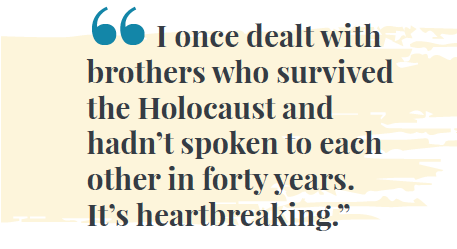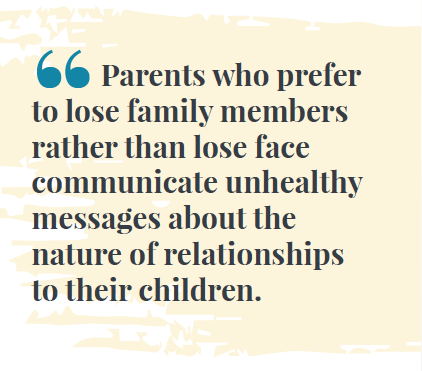A Stinging Silence: Living with Family Estrangement
It’s been two years since Shani has had any contact with her younger sister. She noticed the distancing shortly after her mother passed away. First the unanswered phone calls. Then the two-word text responses and the bare bones, business tone e-mails. Then, nothing.
“I’m still baffled as to why she’s chosen to cut me out of her life,” says Shani. “At times I wonder if I had a sister at all. Maybe, like an imaginary friend, this too was just an illusion. But then it wouldn’t hurt so much.”
Sadly, Shani’s story of family estrangement is not unique in the Orthodox community. Blood may be thicker than water, but like the Red Sea, apparently it too can part.
What compels family members to sever ties?
“The person who is making the choice to reject a family member is convinced that he or she is right,” says Rabbi Simcha Feuerman, LCSW, senior director of operations and strategic development at Ohel Children’s Home and Family Services, based in Brooklyn, New York. “They’re saying ‘he or she is so impossible, so abusive, so disrespectful; I have no choice but to have nothing to do with them.’ [Meanwhile] the rejected party says, ‘I didn’t do anything wrong; why is he rejecting me? I don’t have the problem. He does.’”
There’s something about the familial connection that, when broken, shakes us to the core. The people we grew up with, to whom we mumbled countless “good mornings,” become part of who we are and how we define our place in the world. When cut off from family, one feels a constant void.
“If you took an MRI of a person who is experiencing social ostracism, the same pain center would light up in the brain as when a person experiences physical pain,” says Rabbi Feuerman. “We are hardwired to place a lot of importance on what our immediate circle thinks about us.”
Between Mother and Daughter
However, family members in these situations are not always seeking a resolution.
 “Whether it be siblings, adult children or parents, if they’ve chosen to cut themselves off from the family or family members, it’s because they feel [the situation is so untenable] it’s the only thing they can do,” says Rabbi Feuerman.
“Whether it be siblings, adult children or parents, if they’ve chosen to cut themselves off from the family or family members, it’s because they feel [the situation is so untenable] it’s the only thing they can do,” says Rabbi Feuerman.
Five years ago Chaya cut off all communication with her mother. She blocked her from her phone and e-mail. When her mother tried to reach her through her husband’s e-mail, she blocked her from that as well. She saw it as the only way to get out of what she perceived as an “unsafe relationship.”
“I grew up thinking I was a horrible person,” says Chaya. “My mother called me a ‘bad daughter.’ She told me I was cold. I never understood why. Already at thirteen I wanted to kill myself; I thought I was so worthless.”
Despite her rough childhood, Chaya managed to construct a semblance of a normal life; she married and started raising her own family. But as her family grew, each new child, instead of bringing her closer to her mom, only increased the tension between them. “Here I was feeling vulnerable, having just given birth, and my mother would turn on me like I did something wrong,” says Chaya.
She found herself falling into serious depression and sought professional help. “I realized in therapy that this was a no-win relationship for me. My mother resented my having children. She expected me to parent her. I had to separate.”
Chaya asked her rav if it was halachically permissible for her to stop speaking with her mother. He told her, “Let’s see you get better. You need to be well and then we’ll talk about what you could do for your parents.”
She decided to allow her mother to have annual visits with her grandchildren. Her husband would play host while Chaya made herself scarce, spending the day with a friend. The night before one of the visits, Chaya’s mother asked her son-in-law if she could see Chaya for a few minutes when she arrived. It pushed a button.
“This is exactly the problem! She doesn’t respect any boundaries.” Chaya e-mailed her mother a warning that if she broke the rules, the visits would be over. She doesn’t see the estrangement as a permanent state of affairs, but maintains that the door to any genuine emotional connection “closed many years ago.”
The Sibling Stand Off
The tragic wedge between Yosef and his brothers recorded in the Torah led to dire consequences from which the Jewish people continue to suffer. Rabbeinu Yonah asserts that the baseless hatred that caused the destruction of the Second Beit Hamikdash was, in fact, rooted in the jealousy of Yosef’s brothers. Chazal tell us that jealousy removes a person from the world. Explaining the meaning behind Chazal’s statement, Rabbi Zev Leff,1 popular Torah lecturer and rav of Moshav Matityahu in Israel, describes how jealousy removes one from the world of reality and causes one to view people and incidents in a distorted fashion.
 “My [younger] sister hated me from the minute she was born,” says Talia, who hasn’t spoken to her sister in fifteen years. “It’s not like I was a better or smarter kid; she just always felt threatened by me. Unless my parents’ praise was all directed at her and nothing positive was directed at me, she was bothered.”
“My [younger] sister hated me from the minute she was born,” says Talia, who hasn’t spoken to her sister in fifteen years. “It’s not like I was a better or smarter kid; she just always felt threatened by me. Unless my parents’ praise was all directed at her and nothing positive was directed at me, she was bothered.”
During their college years, Talia continued to feel her sister’s animus. “She was actually a much better student than I was. I was fine with it, but she pushed herself even harder to make sure she outdid me.” Talia hoped that when they grew up the sibling issues would subside. They didn’t.
When her sister gave birth to her second child, Talia came to help her out, hoping to build a bridge. She made meals for the family, cleaned the house and prepared for the shul kiddush in honor of the baby girl. Throughout her stay she detected coldness from her sister and brother-in-law. At the kiddush, when her brother-in-law publicly thanked everyone who assisted his wife and him, he noticeably neglected to mention Talia.
The following week, Talia called to ask her sister why she and her husband had seemed hostile towards her during the visit; she asked, was there anything she had done to offend her? “She told me that I had criticized her husband, which of course I hadn’t,” says Talia. “She then informed me that they didn’t want to have anything to do with me.”
Even her parents began viewing Talia as the instigator and her sister as victim. “Instead of trying to find ways to bring us together, they enabled my sister’s abusive behavior,” she says. “When my sister refused to invite me to my niece’s bat mitzvah celebration, my mother actually encouraged me to send a nice gift with an apology note for not being able to attend. They don’t want to deal with any possible confrontation between my sister and me.”
Talia has since stopped talking to her parents. “I’ve tried so hard. I can’t risk being a punching bag anymore.”
The Root Causes
Festering resentments also tend to surface when parents pass on. Rabbi Moshe Weinberger, rav of Congregation Aish Kodesh in Woodmere, New York, reports that at least once a month he gets a call about a quarrel having to do with a family inheritance. “There are feelings of ‘my parents favored this one over me’ or that he or she didn’t live up to the parents’ expectations. What confirms that is the will,” he says. “The one who felt from the beginning that he was treated in an inferior way pounces on this as an opportunity to finally address grievances that go back before the existence of the will. I’ve seen siblings completely write each other off as a result of a disagreement over a will. It’s devastating.” Rabbi Weinberger frequently consults with mental health professionals on the countless cases that come to his door.
Rather than face their feelings of resentment head-on, some people prefer to hide behind a pretext.
Bob, a secular Jew, and his ba’al teshuvah brother haven’t spoken in over twenty years. It wasn’t Bob’s choice; his brother broke off all contact soon after he became frum.
 “[Before the estrangement], when we spoke it always turned into a heated debate,” says Bob. “He kept trying to convince me to believe what he believed, when he knew I considered myself an atheist.”
“[Before the estrangement], when we spoke it always turned into a heated debate,” says Bob. “He kept trying to convince me to believe what he believed, when he knew I considered myself an atheist.”
He suspects that the true motivation for his brother’s brushoff stems from a deep-seated rage.
“I’m sure I wasn’t the best brother while we were growing up,” he says. “Like most siblings, we fought. He won’t let go of his resentment towards me. Now he can view me as a ‘bad Jew.’”
In his twenty-four years as a pulpit rabbi, Rabbi Weinberger has seen how people resort to religion to justify distancing family members.
“At the core, [when siblings distance themselves from each other] it’s not a theological struggle; it has to do with emotional issues,” says Rabbi Weinberger. “There’s an erosion of relationships between people who used to love each other. I once dealt with brothers who survived the Holocaust and hadn’t spoken to each other in forty years. It’s heartbreaking.”
More than a few decades have passed since Bob and his brother have spoken, yet Bob still holds out hope for reconciliation. “It’s only the two of us; we have no other siblings. You get older and parents age; siblings become very important.” He sends his brother e-mails on the chance he’ll respond one day. “It would be good to have a brother to talk to.”
Choosing Between Spouse and Family
As the adage goes, when you marry your spouse, you’re marrying his or her family. If a wife or husband finds their spouse’s family of origin intolerable, it could lead to the breakup of a family.
It took a divorce to reunite David and his birth family, with whom he hadn’t spoken for close to ten years. He says he felt compelled to cut off ties. With every family get-together he felt torn. “Who leaves their spouse alone on yom tov?” he asks. “My ex-wife kept insisting that my family members were all nasty to her and she refused to see them. Deep down, I knew this wasn’t going to end well.”
 David laments his decision to part ways with his immediate family, leaving his son without half of his grandparents, uncles, aunts and cousins for most of his childhood.
David laments his decision to part ways with his immediate family, leaving his son without half of his grandparents, uncles, aunts and cousins for most of his childhood.
“Before my marriage, I was very close with my nieces. One told me in tears that she lost out on the ‘fun uncle.’ I don’t know if you can rectify stuff like this. It was a hole in her heart for all those years.
“When a person gets married, there are multiple relationships going on,” David continued. “Often, people have unrealistic expectations of one another. I should have been more confident in drawing better boundaries. I can’t just throw my family away. That’s not acceptable, even in a marriage. No one should ever opt for this.”
Rabbi Feuerman says that parents who prefer to lose family members rather than lose face communicate unhealthy messages about the nature of relationships to their children. What’s worse, the tendency to cut off family members can be passed on.
“Family attitudes perpetuate themselves,” says Rabbi Feuerman. “There’s an inability to deal with conflict; it’s much easier to blame others and emotional retreat is seen as a viable solution. It’s not healthy.”
The Fine Art of Forgiving
When someone seriously wrongs us, the last thing we want to do is forgive them. Our pride can’t bear it. Or so we think.
“It all depends on each party’s readiness to see through the other’s eyes,” says Dr. David Pelcovitz, renowned psychologist and professor at Yeshiva University. “The most important part is to realize that neither side is one hundred percent wrong or one hundred percent right. Though we find excuses for our own errors, we tend to judge others more harshly and are reluctant to forgive.”
Dr. Pelcovitz emphasizes that the key to promoting forgiveness is exploring each side’s role in the discord. He suggests a popular “speaker-listener” technique used by marital therapists to facilitate communication, in which both sides take turns in the role of speaker and listener. When the speaker has the floor, he voices his feelings and concerns, and then stops to allow the listener to paraphrase in his own words what he heard. The listener is not to refute or offer his own opinions or perspectives, since he will have his turn to speak.
“The Tiferes Yisroel says your friends will always tell you what you want to hear, but you are not necessarily going to grow from that,” says Dr. Pelcovitz. “It’s from your critics that you grow the most. And you’ll feel great afterwards, benefitting from owning your part [in the conflict].”
 Thou Shalt Apologize
Thou Shalt Apologize
Forgiving is not only a nice thing to do; it’s a halachic obligation.
“Granting forgiveness is as mandatory as requesting it,” says Rabbi Daniel Z. Feldman, a rosh yeshivah at Yeshiva University’s Rabbi Isaac Elchanan Theological Seminary and spiritual leader of Ohr Saadya in Teaneck, New Jersey. “The Mishnah states that ‘one may not be cruel and refuse to forgive.’”
An author of several sefarim on human relationships, Rabbi Feldman points out in his book The Right and the Good: Halakhah and Human Relations, that the imperative is to repeatedly seek mechilah (forgiveness). He notes that the Shulchan Aruch states that an unsuccessful attempt to reconcile demands a second and then a third try, employing a different approach each time.
“[With each failed attempt], he needs to address what may have been missing,” says Rabbi Feldman. “It is a growth process for the offender. Many rabbinic scholars state that the operative element is the embarrassment experienced, which itself serves as part of the atonement.”
The Talmud states that in regard to interpersonal violations, even if they are also considered an affront against God, the transgressions won’t be pardoned on Yom Kippur until amends are made and the aggrieved party is appeased.
Professional Peace Makers
In estrangement cases where the peace efforts of mental health professionals, rabbanim and well-meaning friends have failed, an unassuming Chassidic woman is successfully reuniting family members.
 For the past seven years, Sarah Friedman, a Jewish educator from Boro Park, has tackled family battles most would find daunting. With an uncanny knack for making shalom, Friedman claims a 50 percent success rate, easily competing with highly skilled professional mediators and therapists. Plus, she offers her services for free.
For the past seven years, Sarah Friedman, a Jewish educator from Boro Park, has tackled family battles most would find daunting. With an uncanny knack for making shalom, Friedman claims a 50 percent success rate, easily competing with highly skilled professional mediators and therapists. Plus, she offers her services for free.
Friedman discovered her capacity for chipping away at hardened resentments after her own extended family experienced several tragedies. She turned to a rav for guidance, who told her that unresolved disputes in a family can cause many tzarot. Determined to resolve the conflict in her own family, she relied on instinct, compassion and everyday wisdom to appeal to the family members involved in the rift. She surprised herself at the positive results. The story got out and her phone hasn’t stopped ringing.
“I’ve always had a gift for listening to others’ problems,” she says. “People like to tell me their troubles. It’s really listening and validating their pain. I don’t judge or say anything until I hear both sides. There are actually three sides to a story: side one, side two and what really happened.”
Friedman goes back and forth between the opposing parties, making as many phone calls as it takes to validate both parties’ feelings and present the other side’s perspective. She often asks the disgruntled one to list the three main points bothering him or her and relay them back to the other. It can take months before she brings the family members to a mutually satisfying meeting of minds. It doesn’t sound much different from what a therapist would do, but Friedman is somehow able to penetrate the most resolute wall of pride.
“I do it l’shem mitzvah [for the sake of a mitzvah],” says Friedman. “I think that’s why I get so much siyata d’Shamaya [Divine assistance].”
She rarely gives up on a conflict, though Friedman reports that half the time an angry family member will hang up on her before they even make it to first base.
“Many people can’t tolerate being told they’ve done something wrong,” she says. “I tell them I totally understand their point of view, but to also consider that in every disagreement each side is a little bit wrong and a little bit right. Would they be willing to apologize for the small percentage of what they may have done wrong?”
When someone insists on being the right one, she pulls out a particularly tragic story from her peace-making arsenal.
“A young man in his forties passed away very suddenly,” she relates. “At the levaya, his brother-in-law broke down sobbing uncontrollably. He and the deceased had not been on speaking terms for over ten years. He couldn’t forgive himself. He kept saying, ‘What did I do to myself? Did I really think we would both live forever?’
 “I ask [the parties involved in a conflict], ‘Are you happy living your life never speaking to your sister again?’ No one has yet told me yes, they would like things to stay this way until 120. Deep down, they are upset about it.”
“I ask [the parties involved in a conflict], ‘Are you happy living your life never speaking to your sister again?’ No one has yet told me yes, they would like things to stay this way until 120. Deep down, they are upset about it.”
However, in certain situations reconciliation is not the best answer. Rabbi Weinberger reports having had to advise separation, at least temporarily, between siblings or between parents and children.
“[Although] my goal is always reconciliation,” says Rabbi Weinberger, “when the relationship is causing a breakdown of a person’s life, when he or she is being diminished as a human being and it becomes clear that one or both of the parties is extremely unhealthy, sometimes it is necessary to disengage.”
Coming to Terms with the Silence
Sometimes Shani sees her sister appear in her dreams. She wakes up feeling comforted from the renewed, albeit imaginary, sense of connection with her sibling.
“I guess I’m just a prisoner of hope,” she says. “When I see someone in the supermarket who resembles my sister, I find myself staring at this perfect stranger, not wanting to let go of the image. There’s this longing inside me that won’t quit.”
In an attempt to understand why her sister went AWOL on her, she recently sent her another e-mail: “We’re sisters. Why have you chosen to delete me from your life?” Her sister’s delayed response stated simply, “You should know.”
“It can’t be jealousy; she did everything right,” says Shani. “She graduated from a top school, married young and gave my parents five grandchildren. I’m the one who’s struggled to get my life together. Why would the golden girl resent the black sheep?”
“[After our mother’s death], it was a harrowing time for all of us,” says Shani. “Maybe my sister was displeased with the division of the estate. I suspect it’s much deeper than that. Sometimes, early in the morning, I lie in bed mining for memories of us—as children, teenagers and our respective adult stages in life. I think she always kept a distance from me. Perhaps I threaten her in some way that she’s not even aware of. I may never know. But like a missing appendage, I’m constantly reminded of the loss. It’s just something I’ve got to learn to live with.”
Then again, where there is life there is hope.
Rabbi Weinberger reports having had “tremendous nachas” reuniting estranged family members. “When dealing with people who are working on themselves, who are prepared to step down and acknowledge that they’ve made mistakes, the vast majority of them, with much crying and hugging, will reconcile.”
Bayla Sheva Brenner is a freelance writer and a regular contributor to Jewish Action. She can be reached at baylashevabrenner@outlook.com.


